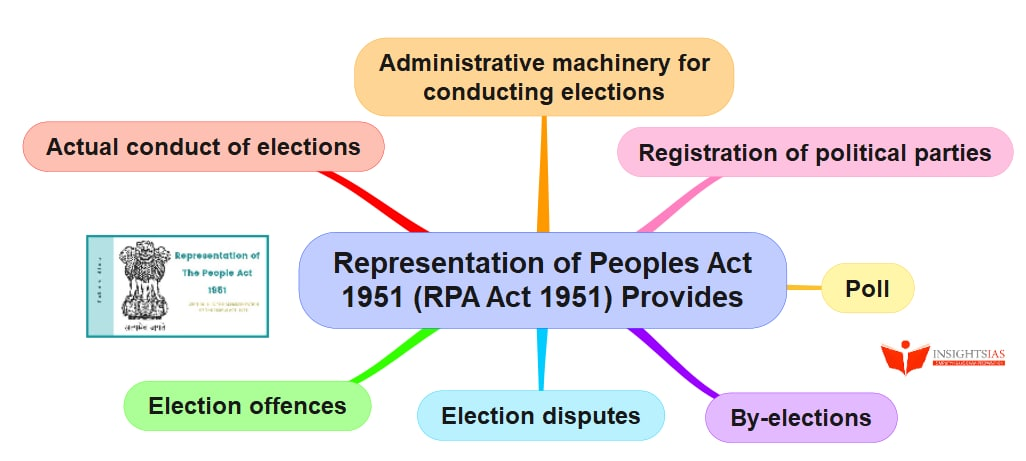Ahmedabad
(Head Office)Address : 506, 3rd EYE THREE (III), Opp. Induben Khakhrawala, Girish Cold Drink Cross Road, CG Road, Navrangpura, Ahmedabad, 380009.
Mobile : 8469231587 / 9586028957
Telephone : 079-40098991
E-mail: dics.upsc@gmail.com

What forms Corrupt Practice under RPA Act, 1951?
News: Recently, the Supreme Court (SC) has said that providing false information about electoral Candidates Qualification is not a Corrupt Practice under RPA (Representation of People’s Act) 1951.
Background:
The SC was hearing a petition, challenging a 2017 Allahabad High Court ruling, which held that declaration of false information pertaining to education qualification does not interfere with the free exercise of electoral rights of the electors.
The petition said that the electoral candidate committed a “corrupt practice' under Section 123(2) by interfering in the free exercise of electoral rights of the voters by not disclosing his liabilities and correct educational qualifications in his affidavit of nomination.
However, The SC declared the Petition as “null and void”, saying that providing false information about a candidate's qualifications cannot be considered a “Corrupt Practice” under Sections 123 (2) and Section 123 (4) of the RPA, 1951.
What are ‘Corrupt Practices’ under the RPA, 1951?
Section 123 of the Act - It defines ‘corrupt practices’ to include bribery, undue influence, false information, and promotion or attempted promotion of “feelings of enmity or hatred between different classes of the citizens of India on grounds of religion, race, caste, community, or language” by a candidate for the furtherance of his prospects in the election.
Section 123 (2) - It deals with ‘undue influence’ which it defines as “any direct or indirect interference or attempt to interfere on the part of the candidate or his agent, or of any other person, with the consent of the candidate or his election agent, with the free exercise of any electoral right.” It may include threats of injury, social ostracism and expulsion from any caste or community.
Section 123 (4) - It extends the ambit of “corrupt practices” to the intentional publication of false statements which can prejudice the outcome of the candidate’s election.
Which practices were held ‘corrupt’ by Court in the past?
Abhiram Singh v CD Commachen Case - In 2017, the SC in ‘Abhiram Singh v C.D. Commachen held that an election will be annulled if votes are sought in the name of a candidate’s religion, race, caste, community, or language, as per Section 123 (3) which prohibits the same.
SR Bommai v Union of India - In 1994, the Supreme Court’s ruling in ‘SR Bommai v. Union of India’, said that the encroachment of religion into secular activities is strictly prohibited, citing subsection (3) of Section 123 of the RPA Act, 1951.

Address : 506, 3rd EYE THREE (III), Opp. Induben Khakhrawala, Girish Cold Drink Cross Road, CG Road, Navrangpura, Ahmedabad, 380009.
Mobile : 8469231587 / 9586028957
Telephone : 079-40098991
E-mail: dics.upsc@gmail.com
Address: A-306, The Landmark, Urjanagar-1, Opp. Spicy Street, Kudasan – Por Road, Kudasan, Gandhinagar – 382421
Mobile : 9723832444 / 9723932444
E-mail: dics.gnagar@gmail.com
Address: 2nd Floor, 9 Shivali Society, L&T Circle, opp. Ratri Bazar, Karelibaugh, Vadodara, 390018
Mobile : 9725692037 / 9725692054
E-mail: dics.vadodara@gmail.com
Address: 403, Raj Victoria, Opp. Pal Walkway, Near Galaxy Circle, Pal, Surat-394510
Mobile : 8401031583 / 8401031587
E-mail: dics.surat@gmail.com
Address: 303,305 K 158 Complex Above Magson, Sindhubhavan Road Ahmedabad-380059
Mobile : 9974751177 / 8469231587
E-mail: dicssbr@gmail.com
Address: 57/17, 2nd Floor, Old Rajinder Nagar Market, Bada Bazaar Marg, Delhi-60
Mobile : 9104830862 / 9104830865
E-mail: dics.newdelhi@gmail.com